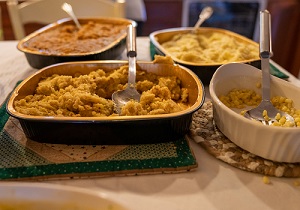 We’ve probably all eaten leftovers past their prime, but how late is too late?
We’ve probably all eaten leftovers past their prime, but how late is too late?
According to the Food and Drug Administration, leftovers should be cooked and/or eaten three to four days after preparation. Which means you have until the Monday after Thanksgiving to use any leftovers.
If that doesn’t seem possible, note that whatever you can’t eat by Monday, you can freeze. This takes planning, because you should freeze whatever you don’t think you can eat by Monday, two hours after it’s prepared. Yes, you can freeze turkey, stuffing, gravy, or mashed potatoes.
While food safety is a serious and important concern, there is some flexibility on the four-day rule depending on the food.
Foods differ in pH levels, moisture content and potential ingredients that bind to water. Cooked foods with a lower pH levels ― think tomato sauce or lemon pie ― typically will last longer, up to one week, as the acidic condition helps prevent bacteria growth. Leftovers with higher pH levels ― such as fish or eggs -– can harbor and grow bacteria more quickly and should be eaten or thrown out at the three-day mark.
According to experts, it’s not quite as simple as a single rule to guide the whole process. Guy Crosby, a certified food scientist and adjunct associate professor at the Harvard T.H. Chan School of Public Health, explained to HuffPost that “the guidelines as stated [by the FDA] are too general ― one size fits all.” Instead, he recommends considering each item based on how the food was prepared, how it was stored and what the item in question is.
Other considerations to note include foods with ingredients that bind water and foods with high moisture contents. Foods containing high levels of sugar, such as cookies, fruit pies, and muffins, bind water and prevent the growth of bacteria and mold. These foods can be kept unrefrigerated and stored in an airtight container for longer periods safely, up to a week. On the other hand, foods with a high moisture content such as cooked meat and cooked vegetables, can grow bacteria more quickly, even when stored in the refrigerator. These should be eaten within the three-day guidelines.
Realistic Guidelines You Can Follow
To ensure you’re safely and adequately storing your food, Crosby recommends keeping food in airtight containers, as oxygen can encourage the growth of bacteria.
- Check the temperature of your refrigerator to ensure that it is keeping food cold enough ― the general recommendation is to maintain the temperature of 35-40 degrees Fahrenheit.
- The back of the fridge tends to be cooler than the front and the door of the fridge, which are usually warmest, so store foods accordingly.
- Grab some painter’s tape and label leftovers with the date they went into the refrigerator.
- If you really want to preserve your leftovers safely past that one-week mark, Crosby recommends freezing them.
- Also, remember if leftover food is still warm when ready for the refrigerator, package it in multiple small containers so it will cool faster and reduce the rate of bacterial growth. Adding a little acid like vinegar and lemon juice will also help,” Crosby said.
Here are some Best Thanksgiving Leftover Recipes from The Food Network.

No comments yet.